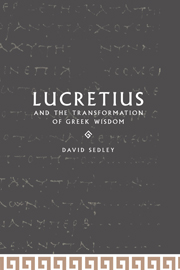Book contents
- Frontmatter
- Contents
- Preface
- Introduction
- Chapter 1 The Empedoclean opening
- Chapter 2 Two languages, two worlds
- Chapter 3 Lucretius the fundamentalist
- Chapter 4 Epicurus, On nature
- Chapter 5 Lucretius' plan and its execution
- Chapter 6 The imprint of Theophrastus
- Chapter 7 The transformation of book I
- Epilogue
- Bibliography
- Index locorum
- General index
- Index of modern scholars
Chapter 6 - The imprint of Theophrastus
Published online by Cambridge University Press: 22 September 2009
- Frontmatter
- Contents
- Preface
- Introduction
- Chapter 1 The Empedoclean opening
- Chapter 2 Two languages, two worlds
- Chapter 3 Lucretius the fundamentalist
- Chapter 4 Epicurus, On nature
- Chapter 5 Lucretius' plan and its execution
- Chapter 6 The imprint of Theophrastus
- Chapter 7 The transformation of book I
- Epilogue
- Bibliography
- Index locorum
- General index
- Index of modern scholars
Summary
THEOPHRASTUS AND THE WORLD'S DESTRUCTIBILITY
The aim of this chapter is to consolidate a picture, which has been growing in the preceding two chapters, of the vital role of Theophrastus in Lucretius' poem.
I shall start with a close look at one particular text, Theophrastus, fr. 184 FHS&G, which I shall argue lies directly behind a series of arguments in Lucretius book V.
Philo (ll. 1–4, De aeternitate mundi 117) reports as follows:
Theophrastus, however, says that those who assert that the world is subject to coming-to-be and passing away were led astray by four principal considerations: (1) the unevenness of the land, (2) the withdrawal of the sea, (3) the dissolution of each of the parts of the whole, (4) the perishing of whole kinds of land animals.
The text then goes on to amplify these four arguments (ll. 4–89, Aet. 118–31). Finally comes a refutation of each of the four in turn.
The four arguments attacked by Theophrastus were identied by Zeller as belonging to Zeno of Citium. As a result, the first part of the same text became Zeno fr. 56 in Pearson's collection, and Zeno fr. 106 in vol. I of von Arnim's Stoicorum Veterum Fragmenta. They are still often regarded as Zenonian, despite the reservations that have been voiced from time to time about the passage's credentials. Zeller's proposal is chronologically hard to sustain, and I shall be maintaining that a better explanation of the arguments' origin is available.
- Type
- Chapter
- Information
- Lucretius and the Transformation of Greek Wisdom , pp. 166 - 185Publisher: Cambridge University PressPrint publication year: 1998



